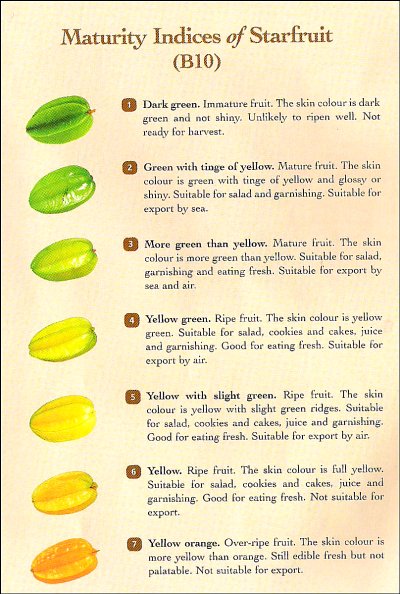: : Malaysia’s Best : :

In the Star today, we received this great flyer from MoA and FAMA on 5 different kind of fruits grown in Malaysia. It’s amazing, I tell you. It provides a background on the fruits and also ripening indices in colour. Know what is the ironic bit? All 5 fruits which are known as local fruit are actually not originally from Malaysia but from other parts of the world.
All the pictures today are scanned from the flyer. I looked around for a softcopy of the flyer drifting around the net but couldn’t find out. Darn. So, decided to scan bits and pieces of it and provide a running commentary. The pictures are about selecting the fruit and how ripe it should be so that it tastes good.
Here is an introduction to the flyer :
“Malaysia’s Best” clearly communicates the promise of quality of each Malaysian fruit. For every farmer under the “Malaysia’s Best” programme has the necessary knowledge and experience in producing quality fruits, from selecting the best seedling to the harvesting period. All the latest in research findings and guidelines on more efficient farming methods like minimizing pesticide usage, for example are also passed on to these farmers on a regular basis to apply to their current or new crop. After which, every fruit picked and selected will go through a very strict and thorough inspection process prior to getting the “Malaysia’s Best” seal of approval.
So, let’s start with mangos :

I never did eat mango when I was a little girl. That’s because I was extremely fussy and never like trying out new kinds of food until I hit my teenage years. That’s when a whole new world opened up to me, including eating vegetables. Anyway, there is this huge mango tree in my neighbour’s house back in Miri. It is so big that eventually the branches spread over to our garden but we seldom eat it because a family of monkeys would get to them first. I also discovered that I like mangoes that are sour if they are cut into small pieces. It’s kind of like stage 4 in the picture above. Yum. Country of Origin : India.

Next on the list are papayas. Everyday, Granny would take some because it cures constipation. Seriously. This is a great natural remedy. Within 30 minutes of eating papaya, one has to rush to the toilet to “pass motion”. In Kuching, the sweet ones are usually the small round ones and that’s the one we usually eat. If you keep the seeds, dry them and plant them in the garden, they will grow easily. Country of Origin : tropical American, possibly southern Mexico.

A very prickly fruit but luckily not as prickly as durian. It’s great for digestion as well but over in Asia, we eat it with a dash of salt else our tongues will get so itchy, it’ll be extremely uncomfortable. Serious. Sometimes, we also eat it with thick and sweetened soy sauce. No, not the rojak sauce which has other herbs inside it. Just plain thick and sweet soy sauce. Yum. Country of Origin : Brazil, Paraquay.

An amazing fruit that is rumoured to cure migraines and headaches. How true is that? Seriously, I’m not sure. Still, it’s a tangy fruit that is sweet. So far, I’ve never tasted a sour starfruit before. Great for salads and eating it fresh as well. Country of Origin : India, Ceylon and the Moluccas.

Heavy as anything. Yet, once it is cut opened, it is worth it. Some are sweet and some are not. There’s no true way to tell if it’s gonig to be very sweet from the outside. I suppose one can always go back to the seller and say that it wasn’t that sweet (in a teasing manner) and see whether you’ll be able to get the next one free or at least, at a discounted price. Amazing fruit. Country of Origin : Africa.
So, there you go. 5 fruits grown in Malaysia. I hope that the guide will be useful for everyone. It was for me.
Here’s a read on how using a squirrel to determine is a durian is ripe. It’s not the first time I’ve heard of it.
All the pictures were scanned from the flyer and the pictures were only edited to make the pictures brighter and smaller. The text remains the same. Am doing a small bit to promote fruits grown locally in Malaysia.





